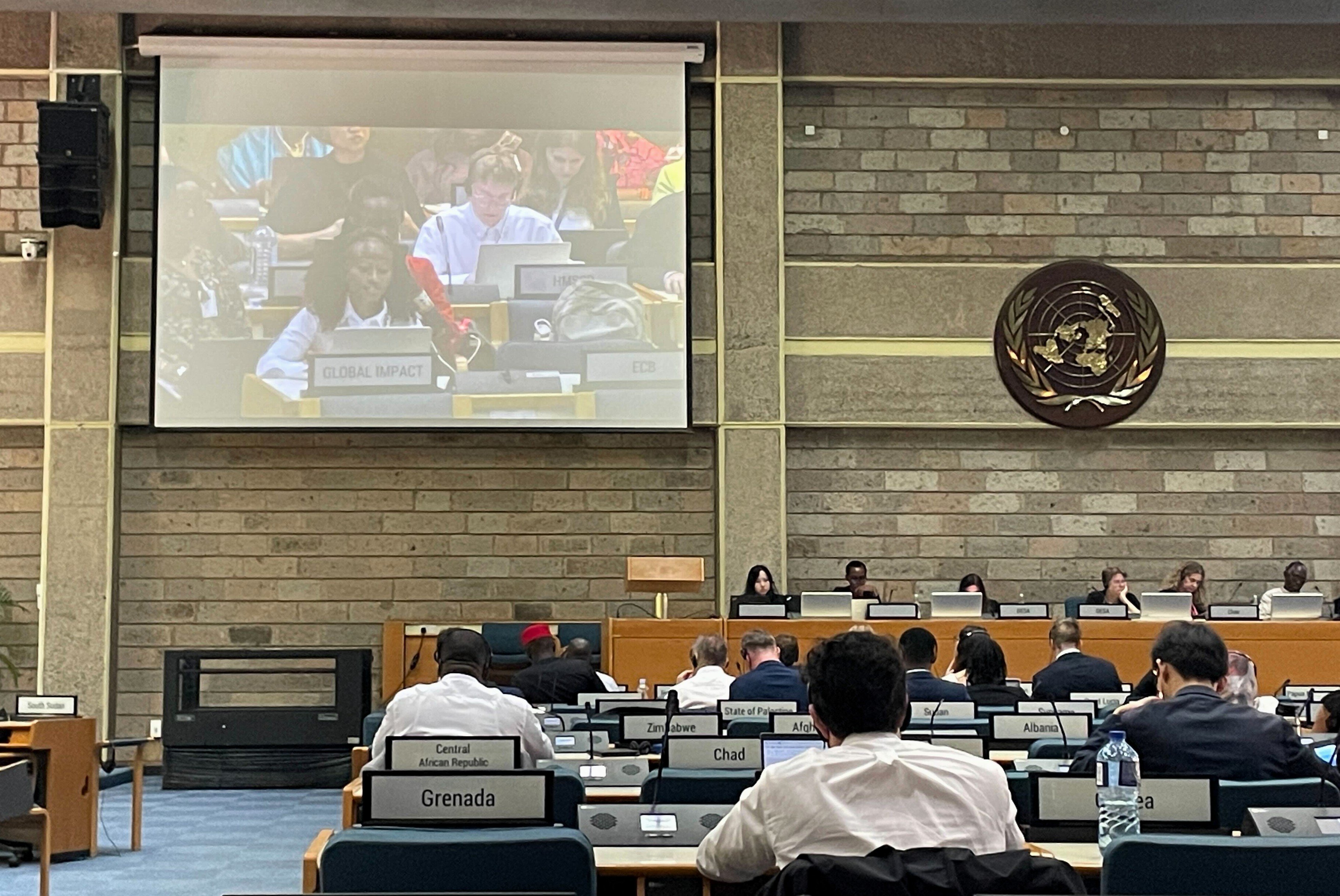Beneficial ownership transparency and the UN Framework Convention on International Tax Cooperation: Connecting information to strengthen fair and effective tax systems

Christine Wachira, Regional Associate for Africa, delivering Open Ownership's statement at the UN Framework Convention on International Tax Cooperation in November 2025
As governments meet in Nairobi to negotiate the UN Framework Convention on International Tax Cooperation (UNFCITC), there is an important opportunity to strengthen how governments exchange and use information about who ultimately owns and controls wealth and assets.
Clear and connected beneficial ownership information is essential to building fairer, more effective tax systems and ensuring that public revenues are protected from misuse. Open Ownership is advocating for strong and ambitious commitments to beneficial ownership transparency within the Convention. This is an opportunity to provide a clear UN mandate to develop systems, standards, and cooperation mechanisms needed to comprehensively connect ownership and asset information across borders.
Why beneficial ownership transparency matters for fair taxation
Information about beneficial ownership is a key part of a fair and effective tax system. With accurate beneficial ownership data, governments can more effectively mobilise domestic resources, strengthen tax collection systems and safeguard public revenue—thereby supporting sustainable development and public services.
Connecting ownership data across borders helps tackle practices that enable tax evasion and illicit financial flows. By shining a light on opaque ownership structures that can enable abuse such as anonymously owned shell companies, beneficial ownership transparency helps ensure that taxation is fair and transparent, strengthening the integrity of both public finances and markets — supporting trust, accountability, and sustainable economic growth.
Advancing beneficial ownership transparency through the Convention
Open Ownership has joined civil society partners from across the globe in calling for beneficial ownership transparency to be explicitly included in the UNFCITC. The joint submission of the Global Alliance for Tax Justice (GATJ), to which Open Ownership is a signatory, recommends that the Convention:
- Introduce an Article in the Convention that establishes a UN Global Asset Register that links all types of assets, companies, and other legal vehicles used to own assets, to their beneficial owners. The GAR should build on domestic implementation of beneficial ownership transparency reforms for legal vehicles and assets, and guarantee automatic exchange of information among all Parties to the Convention (see below).
- Add an Article in the Convention that introduces automatic information exchange on the basis of a commonly agreed standard as a part of the UN Global Asset Register. The standard should ensure that all Parties can get access to AIE on an equal footing, and include a transition phase with non-reciprocal information exchange for developing countries with low capacity.
- Introduce an Article on beneficial ownership transparency, requiring implementation of national beneficial ownership registers of companies and other legal vehicles, adhering to commonly agreed standards so that this information can be incorporated into the UN Global Asset Register.
These recommendations reflect a growing consensus that beneficial ownership transparency is vital to building fairer, more effective tax systems, and set out a strong framework for embedding beneficial ownership transparency in the Convention.
Connecting data for effective implementation
From our work with governments worldwide, Open Ownership has learned that the most effective approach is to improve and connect existing systems rather than create entirely new ones. Therefore, effective solutions developed under the Convention should:
- Build on what exists. National BO registers for companies and other legal vehicles, as well as existing shareholder and nominee and asset registers, already contain valuable information. Connecting and harmonising these sources will be more effective and efficient than collecting new and duplicate data.
- Prioritise data quality and interoperability. Well structured and accurate information enables reliable analysis and exchange.
- Link beneficial ownership data for legal vehicles with asset registers. Connecting legal vehicle and asset records (such as land or property) through shared identifiers helps tax authorities see complete beneficial ownership networks.
- Improve understanding of direct interests. Clear, comparable data on direct links between e.g. a company and a trust, reduces duplication, improves accuracy, and reduces reporting burdens.
- Enable structured, timely access. Moving from ad-hoc information exchange toward direct real-time access reduces friction and strengthens enforcement.
- Ensure clear governance and purpose. Clarity over why and how information is used supports trust, compliance, and defines legitimate access.
Applying these approaches will help countries make beneficial ownership transparency an integral part of strong, fair, and resilient tax systems.
Looking ahead
The UNFCITC presents an important opportunity to embed beneficial ownership transparency into the global tax cooperation architecture. By supporting the proposals set out in the GATJ submission, governments can help ensure that the Convention establishes the standards, systems, and cooperation mechanisms needed to connect ownership and asset information across borders.
Beyond enabling countries to raise more revenue fairly, strengthening beneficial ownership transparency will also help prevent corruption and money laundering, and foster confidence in financial and governance systems worldwide.
Open Ownership will continue to work with governments, international organisations, and others throughout civil society to shape the commitments made within the Convention and subsequent protocols, and bring our experience to bear to ensure that commitments made can be translated into practice.